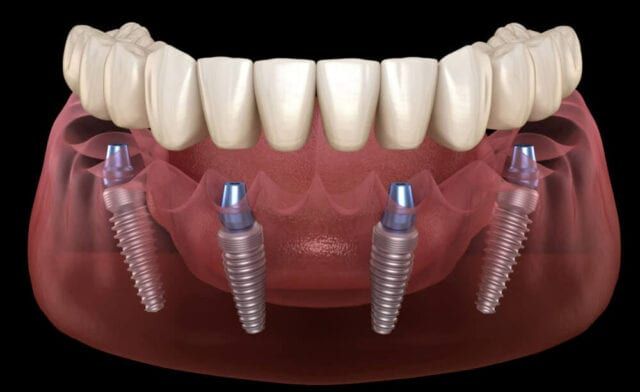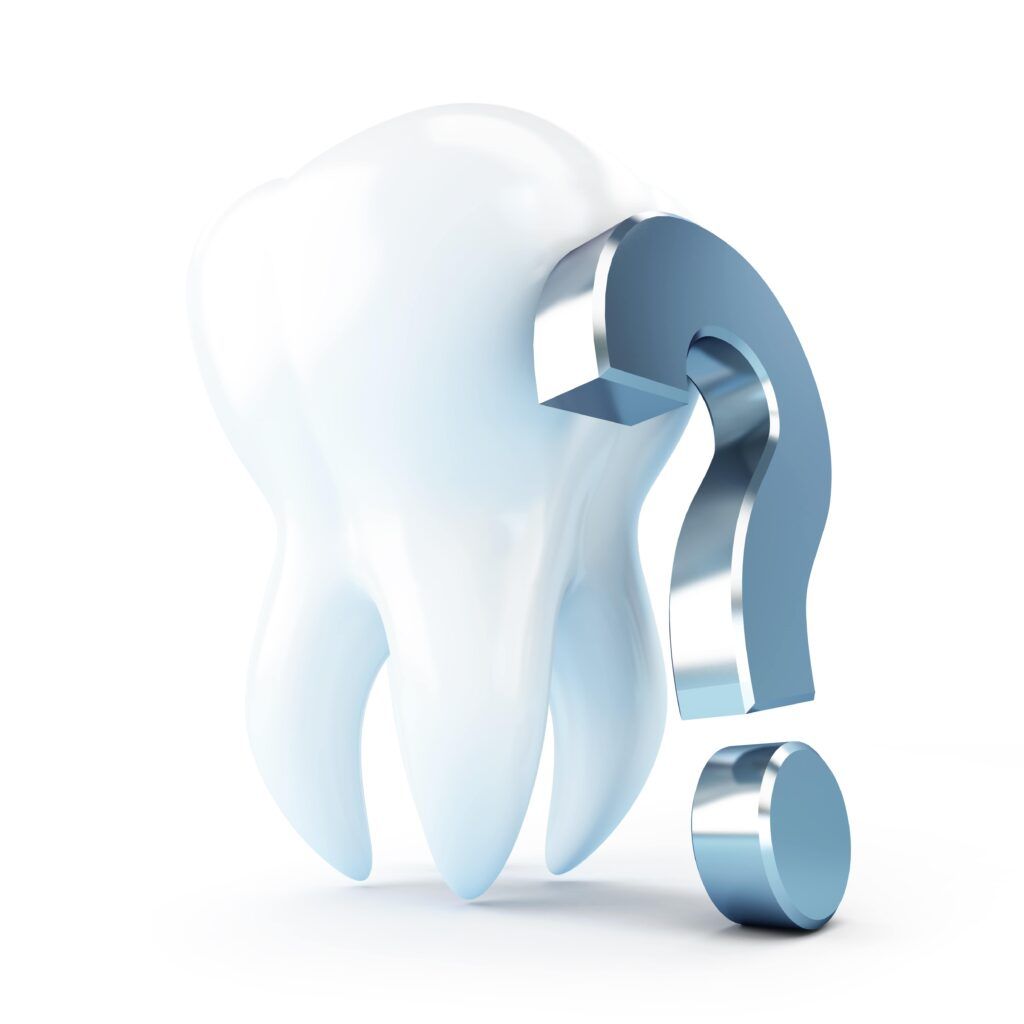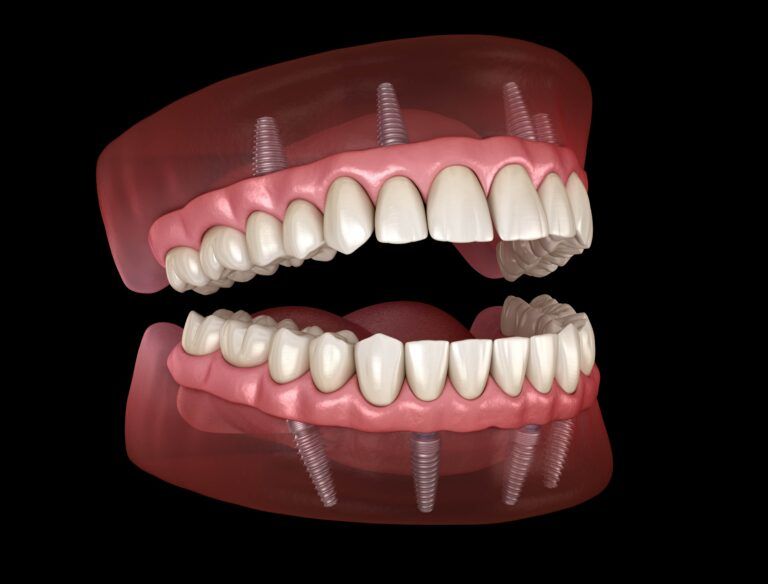The advent of All-on-4 dental implants has revolutionized the realm of full arch restoration, offering a beacon of hope for individuals grappling with extensive tooth loss. This innovative dental procedure transcends the limitations of traditional restoration methods, providing a robust, aesthetically pleasing, and long-lasting solution. All-on-4 implants are distinguished by their ability to support an entire arch of teeth with just four strategically placed implants, a game-changer in the field of dentistry. This blog delves into the intricacies of All-on-4 implants, exploring their benefits, the treatment process, candidacy, and real-life success stories, thereby illuminating why this advanced dental solution is transforming lives and smiles across the globe.
In This Blog:
- Understanding Full Arch Restoration
- What are All-on-4 Dental Implants?
- Benefits of All-on-4 Dental Implants
- The All-on-4 Treatment Process
- Who is a Candidate for All-on-4 Implants?
- FAQs
Understanding Full Arch Restoration
Full arch restoration is a comprehensive dental procedure aimed at completely rebuilding or replacing all the teeth in either the upper or lower jaw, or both. This procedure is typically recommended for individuals who have lost a significant number of teeth, suffer from severe dental decay, or have extensively damaged teeth due to trauma or disease. Traditional full arch restoration methods include dentures and conventional dental implants, which can be time-consuming, uncomfortable, and sometimes aesthetically displeasing. Patients often face challenges like slipping dentures, bone loss, and the lengthy process of receiving traditional implants, which may require multiple surgeries and a long healing period.
What are All-on-4 Dental Implants?
All-on-4 dental implants emerge as a revolutionary solution to these challenges, offering a faster, more stable, and efficient alternative to traditional restoration methods. The “All-on-4” name refers to the technique of supporting an entire arch of teeth with just four dental implants. These implants act as a foundation for a full arch of prosthetic teeth, providing a permanent solution that mimics the look, feel, and function of natural teeth.

The procedure leverages the densest areas of the jawbone, allowing for the strategic placement of the implants without the need for extensive bone grafting, which is often required in traditional implant procedures. Two implants are placed vertically in the front of the jaw, where the bone is typically more robust, while the other two are placed at an angle in the back of the jaw. This angulation increases contact with the bone, enhancing stability and support for the prosthetic arch.
All-on-4 dental implants are known for their immediate results, often allowing patients to leave the dental office with a full set of temporary teeth the same day of surgery, which are then replaced with permanent ones after the healing process is complete. This immediacy, combined with the procedure’s high success rate and the long-term benefits for oral health, such as preventing bone deterioration and restoring facial structure, makes All-on-4 implants a preferred choice for full arch restoration.
Benefits of All-on-4 Dental Implants
The All-on-4 dental implant system offers a multitude of benefits that make it a superior choice for patients needing full arch restoration. These advantages span from immediate functional and aesthetic improvements to long-term oral health benefits:
Immediate Results:
One of the most remarkable benefits of All-on-4 implants is the ability to provide patients with functional, natural-looking teeth immediately after surgery. This quick turnaround minimizes the time patients spend without teeth, enhancing their quality of life and self-confidence.
Improved Oral Health:
All-on-4 implants help preserve the jawbone and prevent the bone loss that typically occurs with tooth loss. By stimulating the bone in a manner similar to natural tooth roots, these implants maintain the jawbone’s strength and integrity, contributing to overall facial structure and oral health.

Enhanced Comfort and Stability:
Unlike traditional dentures, All-on-4 implants are anchored securely in the jawbone, eliminating the discomfort and insecurity of loose-fitting dentures. Patients can eat, speak, and smile without the fear of their prosthetic teeth shifting or falling out.
Long-Term Durability:
Designed for durability and longevity, All-on-4 implants are a long-term solution for tooth loss. With proper care and maintenance, these implants can last a lifetime, making them a cost-effective investment in the long run.
Less Invasive Procedure:
Because only four implants are used to support the entire arch of teeth, the procedure is less invasive compared to traditional methods that require more implants and, often, bone grafting. This can lead to a quicker, less painful recovery process and a shorter overall treatment time.
Aesthetic Benefits:
All-on-4 implants provide a full arch of teeth that look, feel, and function like natural teeth. They are designed to blend seamlessly with the patient’s facial structure and natural gum line, enhancing the smile and overall facial aesthetics.
Improved Speech and Eating Functionality:
With the stability and natural feel of All-on-4 implants, patients often experience significant improvements in speech and the ability to eat a variety of foods, leading to better nutrition and overall well-being.
Low Maintenance:
Caring for All-on-4 implants is similar to caring for natural teeth, involving regular brushing, flossing, and dental check-ups, without the need for the special cleaning procedures required for traditional dentures.
By addressing both aesthetic and functional needs, All-on-4 dental implants significantly improve the quality of life for individuals undergoing full arch restoration, making them a revolutionary solution in the field of modern dentistry.
The All-on-4 Treatment Process
The All-on-4 dental implant treatment process is streamlined and efficient, designed to minimize discomfort and reduce treatment time. Here’s a step-by-step overview of what patients can expect during the All-on-4 treatment journey:
Initial Consultation and Evaluation:
The process begins with a thorough evaluation, including dental exams, X-rays, and 3D imaging, to assess the patient’s oral health, bone density, and suitability for the All-on-4 procedure. During this consultation, the dentist discusses the patient’s medical history, treatment expectations, and the potential for a successful outcome.
Treatment Planning:
Utilizing the information gathered, the dental team develops a personalized treatment plan. Advanced technology, such as computer-aided design (CAD) and computer-aided manufacturing (CAM), may be used to plan the implant placement precisely and design the prosthetic teeth.
Surgical Procedure:
On the day of surgery, the patient is typically given anesthesia to ensure comfort. The dentist then places the four implants in the jawbone, with two implants at the front of the mouth and two at the back, angled to maximize stability and support. If extractions are necessary, they are usually performed during the same surgical session.
Immediate Loading of Temporary Prosthesis:
Often, a set of temporary teeth can be attached to the implants immediately following their placement. These temporary teeth are fully functional and allow the patient to eat, speak, and smile confidently while the implants integrate with the jawbone, a process known as osseointegration.
Healing and Osseointegration:
The healing phase typically lasts three to six months, during which the implants fuse with the jawbone. This period is crucial for the stability of the implants and the long-term success of the treatment.
Placement of Permanent Prosthesis:
Once osseointegration is complete, the temporary teeth are replaced with the final, custom-made prosthesis. These permanent teeth are designed to match the natural color, shape, and size of the patient’s teeth, providing a comfortable and aesthetically pleasing result.
Follow-Up and Maintenance:
Regular follow-up appointments are scheduled to monitor the implants and ensure the health of the patient’s oral tissues. Proper oral hygiene and regular dental check-ups are essential to maintain the health and longevity of All-on-4 implants.
The All-on-4 treatment process offers a streamlined and effective solution for full arch restoration, transforming patients’ smiles and improving their oral health in a relatively short period. With its innovative approach, the All-on-4 system has become a popular and reliable choice for patients seeking a permanent solution to significant tooth loss.
Who is a Candidate for All-on-4 Implants?
Determining candidacy for All-on-4 dental implants involves assessing various factors related to a patient’s oral health, bone density, and overall medical condition. The ideal candidates for this procedure typically exhibit the following characteristics:
- Significant Tooth Loss or Decay: All-on-4 implants are primarily designed for individuals who have lost most or all of their teeth in one or both jaws, or whose teeth are so decayed or damaged that they require extraction.
- Inadequate Bone Density for Traditional Implants: Patients who lack sufficient jawbone density to support traditional implants may benefit from All-on-4 implants. The technique’s strategic placement of fewer implants avoids the need for extensive bone grafting.
- Desire for a Fixed, Permanent Solution: All-on-4 implants are suitable for patients looking for a more stable and permanent solution compared to removable dentures, providing the convenience of fixed teeth that mimic the function and appearance of natural teeth.
- Good Overall Health: While age is not a primary factor, candidates must be in good general health to undergo the surgical procedure. Conditions that may affect healing and implant success, such as uncontrolled diabetes or cardiovascular disease, need to be managed before proceeding with the treatment.
- Non-Smokers or Willing to Quit: Smoking significantly affects the healing process and the long-term success of dental implants. Patients who smoke are advised to quit or reduce smoking to improve their candidacy for the procedure.
- Commitment to Oral Hygiene and Regular Dental Visits: Candidates must be committed to maintaining excellent oral hygiene and regular dental check-ups to ensure the longevity of their All-on-4 implants.
It’s important to note that while the All-on-4 procedure is highly versatile and suitable for many patients with tooth loss, a comprehensive evaluation by a dental professional is essential to determine individual suitability. This evaluation includes a review of the patient’s dental and medical history, oral health status, and specific needs and goals for treatment. By carefully selecting candidates, dental professionals can maximize the success rate and satisfaction with the All-on-4 treatment.
FAQs about All-on-4 Dental Implants
How long do All-on-4 implants last?
All-on-4 dental implants are designed to be a long-term, permanent solution for tooth loss. With proper care and maintenance, including good oral hygiene practices and regular dental check-ups, these implants can last 20 years or more. The longevity of the implants largely depends on the patient’s lifestyle, health, and commitment to oral care.
Is the All-on-4 procedure painful?
Patients typically experience some discomfort and swelling after the surgery, which can be managed with prescribed pain medications and cold compresses. The procedure itself is performed under anesthesia, ensuring that patients feel no pain during the implantation process. Most patients report that the discomfort is less than they expected and is manageable with the recommended aftercare.

How long is the recovery time after getting All-on-4 implants?
The initial healing period after All-on-4 surgery typically lasts a few weeks, during which patients may experience swelling and discomfort. However, most people can return to their normal daily activities within a few days. Complete integration of the implants with the jawbone, known as osseointegration, takes around three to six months, after which the permanent prosthesis is placed.
Are there any risks associated with All-on-4 implants?
As with any surgical procedure, there are some risks involved with All-on-4 dental implants, including infection, implant failure, and complications related to anesthesia. However, these risks are relatively low, and the success rate of All-on-4 implants is high when performed by experienced dental professionals.
How do I care for my All-on-4 implants?
Caring for All-on-4 implants involves regular brushing, flossing, and dental check-ups, similar to natural teeth. Special attention should be given to cleaning around the implant posts and under the prosthetic arch to prevent infection and ensure the longevity of the implants.
Conclusion
In conclusion, All-on-4 dental implants represent a significant advancement in dental technology, offering a lifeline to those suffering from severe tooth loss or decay. This innovative procedure not only restores full dental functionality and aesthetics but also improves overall quality of life. With benefits such as immediate results, enhanced comfort, and long-term durability, All-on-4 implants stand out as a preferred choice for full arch restoration. By understanding the treatment process, candidacy, and addressing common concerns, patients can make an informed decision about pursuing this transformative dental solution. As with any medical procedure, consulting with a qualified dental professional is crucial to determine individual suitability and to embark on a journey towards a healthier, more confident smile.

